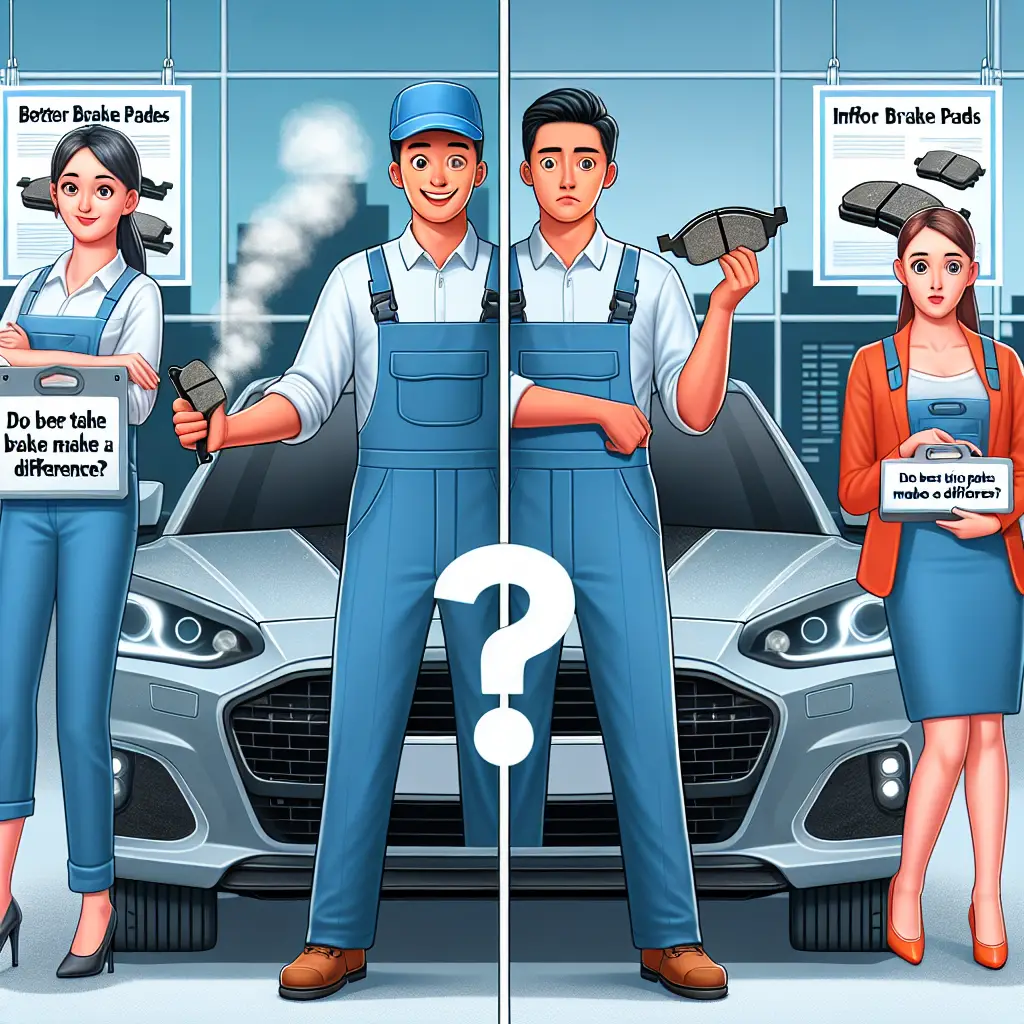Do Better Brake Pads Make a Difference? Yes. Find out why.
When you’re cruising down the highway or navigating through city traffic, the last thing you want to worry about is whether your car will stop when you press the brakes. It’s a given, right? Well, not quite. The truth is, the type of brake pads you have on your vehicle can make a significant difference in stopping power, durability, and overall safety. Today, let’s explore why investing in better brake pads is a move every driver should consider.
The Role of Brake Pads in Vehicle Safety
First things first: understanding the basics. Brake pads are crucial components of a car’s braking system. When you hit the brake pedal, the brake pads press against the rotors (discs) to create friction, which slows down your car. The effectiveness of this process largely depends on the quality of your brake pads.
According to the National Highway Traffic Safety Administration (NHTSA), brake-related issues account for a significant number of vehicle accidents each year. In their report on 2015 crash statistics, brake problems were found to be present in an estimated 22% of vehicles involved in crashes where vehicular failure was cited as the contributing factor (NHTSA).
Types of Brake Pads: A Comparative Overview
There are several types of brake pads on the market, each suited to different driving needs:
- Organic Brake Pads: Made from a mixture of various fibers bound together with resin, these pads are quieter but tend to wear out faster.
- Ceramic Brake Pads: Composed mostly of ceramic fibers, these pads are durable and provide excellent stopping power without much noise or dust.
- Semi-Metallic Brake Pads: These pads consist of metal shavings of copper, steel, iron, or other composites, making them more responsive and heat-resistant.
- Low Metallic NAO Pads: Contain small amounts of metal to provide better braking and heat transfer, but can be noisier and produce more dust.
Knowing the differences can be a game changer for safety and performance — more on this later.
The Impact of Superior Brake Pads
Stopping Distance
Better brake pads can significantly reduce your vehicle’s stopping distance. In tests conducted by Consumer Reports, they found that not all brake pads perform equally, and stopping distances varied widely depending on the brand and type of brake pad (Consumer Reports). A premium brake pad could potentially shave feet off your stopping distance, which might be the difference between a close call and a collision.
Durability and Longevity
Higher quality brake pads might come with a steeper price tag upfront, but they often last much longer. Semi-metallic and ceramic pads, for example, are known for their durability compared to organic pads, meaning fewer replacements over the vehicle’s life span.
Heat Dissipation
Good brake pads can handle the heat — literally. Braking generates a lot of heat, and if that heat isn’t managed properly, it can lead to brake fade, where the effectiveness of the brakes reduces. High-quality brake pads, like ceramic or semi-metallic options, generally have better heat dissipation properties, maintaining performance even during intense use.
Noise and Dust
Let’s talk comfort. Nobody likes squeaky brakes or excessive brake dust that soils your wheels. High-end ceramic brake pads are recognized for their quiet operation and low dust production, ensuring a more pleasant driving experience and keeping your wheels cleaner.
Do You Need to Upgrade Your Brake Pads?
Now that you’re aware of the benefits, you might be asking yourself whether it’s time for an upgrade. If you’re experiencing longer stopping distances, more noise, or if your pads seem to wear down quickly, it could be a sign to look into higher-quality brake pads.
Additionally, think about your driving style and the conditions you face. If you’re often in stop-and-go traffic, descending steep roads, or if you prioritize safety and performance, investing in top-tier brake pads should be a consideration.
Making the Right Choice for Your Vehicle
Choosing the right brake pads involves understanding your vehicle’s requirements and your driving habits. A reputable mechanic can provide insight based on these factors. Moreover, look for certified and tested products from well-known brands. The Brake Manufacturers Council offers guidelines for quality and performance, which can help in making an informed decision.
Purchasing from a credible source is equally important, as this ensures that you’re getting genuine, high-quality products. Your local dealership or auto parts store typically carries a range of options and can offer advice on the best brake pads for your car, considering factors like model, weight, and usage.
Conclusion: Safety is Not Negotionable
When it comes down to it, the quality of your brake pads has a tangible impact on safety, performance, and even your wallet in the long run. While cost and personal preference will influance your decision, it’s clear that an upgraded braking system will help keep you and your passengers safer on the roads.
Safety may come at a price, but with the right brake pads, you’ll be making a valuable investiment in your vehicle. Not all brake pads are created equal, and choosing better brake pads can indeed make a significant difference to your driving experience.
Remember, regular maintenance is also vital. Even the best brake pads won’t perform if they’re not properly looked after. And if you’re ever in doubt about the condition of your brakes, or which pads to choose, don’t hesitate to consult with a qualified mechanic. After all, when it comes to vehicle safety, cutting corners is simply not worth the risk.
Stay safe on the roads, and never underestimate the power of quality brakes at your tire-tips. Whether it’s a split-second reaction to avoid a road hazard or simply the everyday peace of mind from knowing your vehicle is equipped to handle whatever comes its way, better brake pads are not just a purchase; they’re an investment in your journey’s security.

